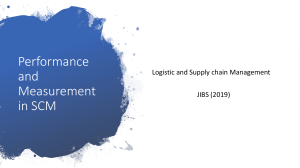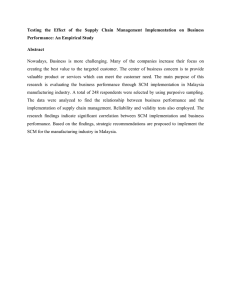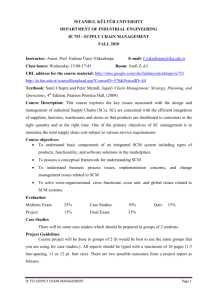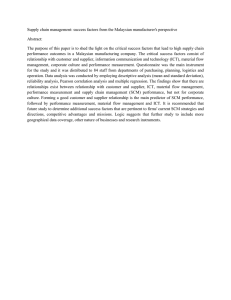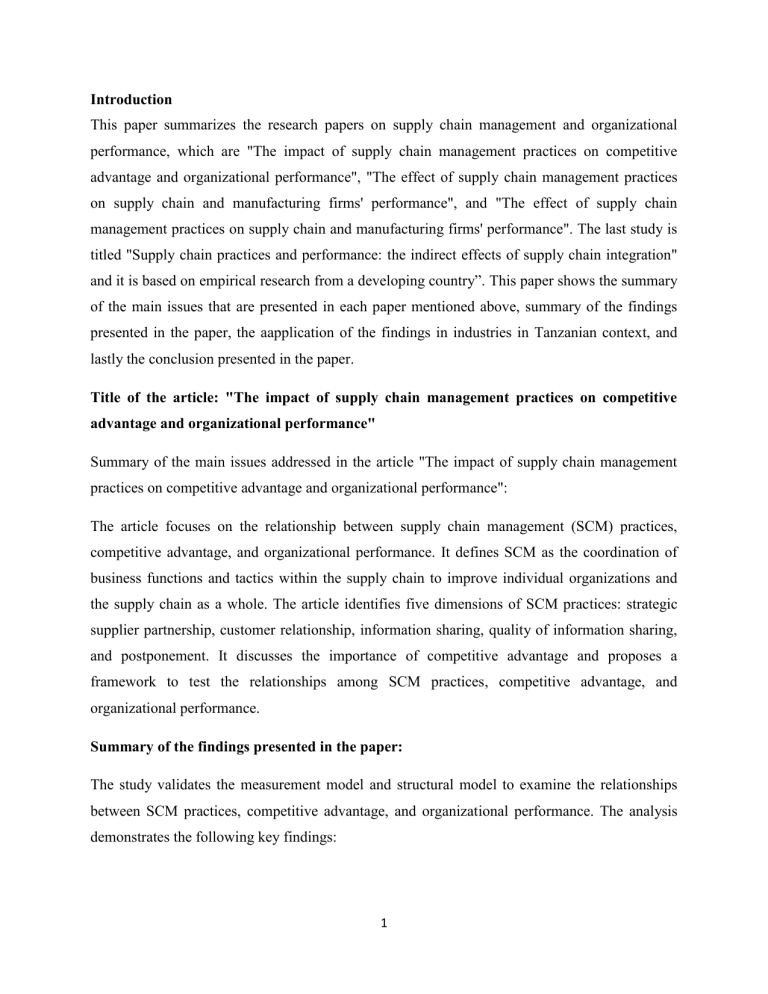
Introduction This paper summarizes the research papers on supply chain management and organizational performance, which are "The impact of supply chain management practices on competitive advantage and organizational performance", "The effect of supply chain management practices on supply chain and manufacturing firms' performance", and "The effect of supply chain management practices on supply chain and manufacturing firms' performance". The last study is titled "Supply chain practices and performance: the indirect effects of supply chain integration" and it is based on empirical research from a developing country”. This paper shows the summary of the main issues that are presented in each paper mentioned above, summary of the findings presented in the paper, the aapplication of the findings in industries in Tanzanian context, and lastly the conclusion presented in the paper. Title of the article: "The impact of supply chain management practices on competitive advantage and organizational performance" Summary of the main issues addressed in the article "The impact of supply chain management practices on competitive advantage and organizational performance": The article focuses on the relationship between supply chain management (SCM) practices, competitive advantage, and organizational performance. It defines SCM as the coordination of business functions and tactics within the supply chain to improve individual organizations and the supply chain as a whole. The article identifies five dimensions of SCM practices: strategic supplier partnership, customer relationship, information sharing, quality of information sharing, and postponement. It discusses the importance of competitive advantage and proposes a framework to test the relationships among SCM practices, competitive advantage, and organizational performance. Summary of the findings presented in the paper: The study validates the measurement model and structural model to examine the relationships between SCM practices, competitive advantage, and organizational performance. The analysis demonstrates the following key findings: 1 1. Validity and reliability: The measurement items for SCM practices, competitive advantage, and organizational performance are reliable and valid. The constructs demonstrate high internal consistency and explain a significant proportion of the variance. 2. Relationships between SCM practices and performance: The study confirms that higher levels of SCM practices are associated with better organizational performance. Effective SCM practices directly influence competitive advantage, leading to improved organizational performance. 3. Mediating role of competitive advantage: Competitive advantage mediates the relationship between SCM practices and organizational performance. Implementing effective SCM practices contributes to competitive advantage, which, in turn, positively affects organizational performance. 4. Contextual factors: The study acknowledges that industry type, firm size, position in the supply chain, and supply chain length may influence the implementation and effectiveness of SCM practices. The findings highlight the importance of considering contextual factors when implementing SCM practices. Application of the findings in industries in the Tanzanian context: The findings of the paper have several applications in various industries in Tanzania: 1. SCM Practices: Tanzanian industries, such as manufacturing, retail, agriculture, and logistics, can adopt the identified SCM practices. This includes establishing strategic supplier partnerships, enhancing customer relationships, sharing information effectively, ensuring quality information sharing, and implementing postponement strategies. 2. Competitive Advantage: Tanzanian companies can leverage SCM practices to gain a competitive edge. Implementing effective SCM strategies, such as cost management, quality improvement, and time-to-market optimization, can differentiate companies in industries like agriculture, manufacturing, and services. 2 3. Organizational Performance: Adopting SCM practices can enhance overall organizational performance. Industries such as manufacturing, construction, and transportation can benefit from improved operational efficiency, cost reduction, and increased customer satisfaction. 4. Contextual Factors: Tanzanian companies need to consider contextual factors specific to their industries. Industries like tourism, mining, and telecommunications may have unique supply chain challenges and requirements that require tailored SCM practices. Conclusion presented in the paper: The article concludes that SCM practices are crucial for building sustainable competitive advantage and improving organizational performance. It emphasizes the need to consider industry-specific factors when implementing SCM practices. The findings provide insights for practitioners and researchers, and the application of effective SCM practices can contribute to the growth and development of Tanzanian industries. Further research can explore additional dimensions and context-specific SCM practices to enhance understanding and application. "The effect of supply chain management practices on supply chain and manufacturing firms' performance": Supply chain management (SCM) is a crucial set of activities that involve planning, organizing, and controlling the flow of goods and services from suppliers to customers. The effective implementation of SCM practices can lead to improved performance for both supply chains and individual firms. The article "The effect of supply chain management practices on supply chain and manufacturing firms' performance" highlights several key SCM practices and their impact on firm performance. 1. Strategic supplier partnerships: Developing strong relationships with suppliers can lead to better collaboration, coordination, and trust. This practice enables firms to enhance their supply chain efficiency, reduce costs, and improve overall performance. 2. Level of information sharing: Sharing relevant information with supply chain partners allows for better coordination and 3 decision-making. It facilitates real-time communication, reduces information asymmetry, and enables timely responses to changes in demand or supply. 3. Quality of information sharing: Not only is information sharing important, but the quality of shared information also plays a significant role. Accurate, complete, and reliable information enables supply chain partners to make informed decisions, reduces uncertainties, and improves overall performance. 4. Customer service management: Focusing on customer satisfaction and providing superior service can lead to increased customer loyalty, repeat purchases, and positive word-ofmouth. Effective customer service management ensures that customer demands are met efficiently throughout the supply chain. Summary of the findings presented in the paper: There are significant relationships between supply chain management practices (SCMP), supply chain performance (SCP), and firms' performance (MFP). SCMP positively impact both SCP and MFP. SCP has a positive impact on MFP. Improving operational efficiency, customer satisfaction, and innovation are intermediate variables through which SCM practices influence firm performance. Application of the findings in industries in the Tanzanian context: Tanzanian industries can benefit from implementing effective supply chain management practices to enhance supply chain performance and overall firm performance. Industries such as manufacturing, agriculture, retail, and logistics can focus on practices that improve supply chain flexibility, integration, customer responsiveness, and supplier performance. Optimizing supply chain activities can lead to improved operational efficiency, customer satisfaction, and profitability. Conclusion presented in the paper: 4 Effective supply chain management practices positively impact supply chain performance and firm performance. All dimensions of supply chain management practices contribute to supply chain performance, emphasizing the importance of adopting sound practices. The adoption of effective supply chain management practices directly influences firms' overall performance, including financial performance, market share, and competitiveness. Improvements in supply chain performance positively influence firms' performance outcomes. Investing in effective supply chain management practices is crucial for enhancing overall performance in Tanzanian industries. The effect of supply chain management practices on supply chain and manufacturing firms’ performance Summary of the main issues presented in each paper mentioned above: The article discusses the gap between theory and practice in supply chain management (SCM) due to its interdisciplinary nature and evolutionary characteristics. The authors argue that studying specific SCM practices adopted by different countries and industries can help bridge this gap and understand unique characteristics within particular contexts. The focus is on the Jordanian manufacturing sector as a unique context for studying SCM practices. Summary of the findings presented in the paper: There is a significant positive relationship between SCM practices and supply chain performance (SCP). All SCM practices together have a significant impact on SCP. 5 There is a strong positive correlation between SCM practices and overall firm performance (MFP). SCP has a significant positive influence on MFP. Application of the findings in industries in Tanzanian context: 1. SCMPs and SCP: Tanzanian manufacturing firms can benefit from adopting effective SCMPs to improve SCP. Strategies such as efficient inventory management, streamlined logistics, and effective supplier relationships can enhance SCP in Tanzanian firms. 2. SCMPs and MFP: Tanzanian manufacturing firms can focus on improving SCMPs to positively impact MFP. Effective SCMPs like lean manufacturing practices, quality management systems, and collaboration with key stakeholders can contribute to improved productivity, cost reduction, and enhanced competitiveness. 3. SCP and MFP: Optimizing supply chain processes, reducing lead times, improving delivery reliability, and enhancing customer satisfaction can positively impact MFP in Tanzanian firms. Conclusion presented in the paper: SCM practices play a crucial role in enhancing the performance of supply chains and manufacturing firms. The study provides empirical evidence supporting the positive relationship between SCM practices, SCP, and MFP. The findings have implications for both researchers and practitioners in the field of SCM. The article emphasizes the importance of implementing and measuring SCM practices for supply chain and manufacturing firm performance improvement 6 Impact of supply chain management practices on firm performance Empirical evidence from a developing country” Summary of the main issues addressed in the article: Complex retail environment: The retail industry in India is becoming more complex due to competition, changing consumer preferences, and shorter product life cycles. Managing the supply chain effectively becomes challenging in such an environment. Underdeveloped infrastructure: The infrastructure in India, including roads, airports, seaports, railways, and information technology, is relatively underdeveloped compared to other countries. This lack of infrastructure hampers the maturity and efficiency of the supply chain. Lack of technology adoption: Many retailers in India still rely on outdated methods for tracking shipments, resulting in a lack of real-time inventory and order visibility. The low integration of technology in supply chain processes leads to missed sales opportunities. Taxation and cost inefficiencies: The complex taxation system in India increases overall costs for retailers. Additionally, long purchase order lead times cause delays in product availability. Summary of the findings presented in the paper: The study found that supply chain management practices (SCMPs), including customer relationship management (CRM), supplier relationship management (SRM), goal congruence (GC), and information sharing (IS), have a significant impact on supply chain performance (SCP) and firm performance (FP). CRM and SRM were particularly influential in SCP, while GC indirectly affected FP through SCP. Application of the findings in industries in Tanzanian context: The findings of the paper can be applied to various industries in Tanzania. Tanzanian industries can benefit from implementing effective supply chain management practices, prioritizing customer relationship management, fostering supplier relationships, promoting information sharing, enhancing supply chain coordination, and recognizing the mediating role of supply chain performance in driving firm performance. Conclusion presented in the paper: 7 The article concludes that effective supply chain management practices are crucial for enhancing supply chain performance and firm performance in the organized retail industry in India. By improving SCMPs, such as CRM, SRM, GC, and IS, retailers can achieve operational efficiencies, process improvements, and overall profitability. The study provides valuable insights for both research and supply chain managers in the organized retail sector, emphasizing the strategic role of SCMPs in driving performance Supply chain practices and performance: the indirect effects of supply chain integration Summary of the main issues addressed in the article "Supply chain practices and performance: the indirect effects of supply chain integration": Lack of understanding of comprehensive SCMPs: Many organizations struggle to implement effective supply chain management strategies because they lack a clear understanding of what constitutes a comprehensive set of supply chain management practices (SCMPs). Importance of SCMPs for collaboration, performance, and competitiveness: The article highlights the importance of SCMPs in improving organizational collaboration, performance, and competitiveness in the global market. Need for supply chain integration (SCI): The article focuses on the mediating role of supply chain integration (SCI) in the relationship between SCMPs and supply chain performance (SCP). It emphasizes the importance of integrating supply chain activities and processes for improved performance. Focus on the electronics manufacturing industry in Malaysia: The study chooses the electronics manufacturing industry in Malaysia as a case study due to its significant contribution to the country's manufacturing output, exports volume, and employment opportunities. The industry has a high level of supply chain implementation. Summary of the findings presented in the paper: All seven dimensions of SCMPs (information quality, information sharing, customer relationship management, supply strategic partnership, agreed vision and goals, 8 postponement strategies, and risk and reward sharing) are significantly positively associated with SCI and SCP. Information quality, agreed vision and goals, and postponement strategies are fully mediated by SCI in their influence on SCP. Supply strategic partnership, customer relationship management, and information sharing are partially mediated by SCI. Risk and reward sharing has no effect on SCI and performance. The positive effects of SCMPs and SCI on SCP are supported empirically, confirming previous research studies. Application of the findings in industries in Tanzanian context: Enhancing organizational collaboration: Fostering collaboration and coordination among various stakeholders in the supply chain can lead to improved performance and competitiveness in any industry in Tanzania. Identifying comprehensive SCMPs: Organizations in Tanzania need to understand and implement a comprehensive set of SCMPs that are aligned with their specific industry characteristics and requirements. Strategic nature of SCMPs: SCMPs should aim to improve the performance of individual organizations and the entire supply chain, which applies to all industries in Tanzania. Mediating role of SCI: Recognizing the importance of integrating supply chain activities and processes to fully leverage the benefits of SCMPs and achieve improved performance in all industries in Tanzania. Importance of specific SCMPs: Prioritizing specific SCMPs based on their potential impact on SCI and SCP can guide organizations in Tanzania in improving their overall supply chain performance. 9 Conclusion presented in the paper: The study concludes that there is a significant relationship between SCMPs, SCI, and SCP in the electronics manufacturing industry in Malaysia. Implementation of SCMPs positively influences SCI, which, in turn, leads to improved SCP. The study emphasizes the importance of implementing comprehensive SCMPs to enhance supply chain integration and improve supply chain performance. However, the findings are specific to the electronics manufacturing industry in Malaysia, and further research is needed to determine the applicability of these findings to other industries in Tanzania or different contexts. 10
